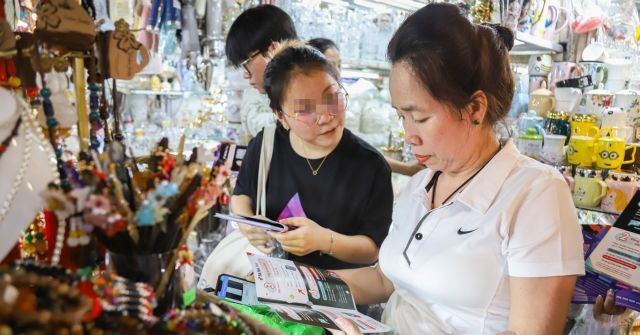Chinese items have become more and more popular in many traditional markets in HCM City. In some wholesale outlets such as Tân Bình and An Đông, it's not difficult for customers to find Chinese goods priced from tens of thousands to hundreds of thousands of đồng.

With cheap Chinese goods flooding Việt Nam, many small traders who want to survive in business have gradually turned their backs on Vietnamese products, selling Chinese ones instead.
Flocking to local markets
Chinese items have become more and more popular in many traditional markets in HCM City. In some wholesale outlets such as Tân Bình and An Đông, it's not difficult for customers to find Chinese goods priced from tens of thousands to hundreds of thousands of đồng.
Đặng Thị Lệ Nguyên, a clothing retailer in An Đông market said in the past, about 40-50 per cent of goods on her stall came from Việt Nam, while the rest were from China. In the past five or six years, however, the ratio of Chinese goods had increased to 70-80 per cent.
In addition to diverse designs, Chinese goods are often cheaper than Vietnamese goods by 5-15 per cent, even 20-25 per cent. Thanks to that, it's easier for traders to sell Chinese products and gain profits, Nguyễn told Tuổi Trẻ (Youth) newspaper.
For example, a Made-in-Việt Nam dress costs between VNĐ200,000 and VNĐ250,000, but a similar dress from China is priced at VNĐ150,000-200,000.
Nguyễn Thị Bình, a trader at Thủ Đức Market, said that domestic fashion products have always lagged behind Chinese ones, so traders find it difficult to import them from Việt Nam.
Previously, around Tân Bình Market, there were hundreds of tailor shops that provided cheap fashion products and retailers at traditional markets could buy directly from these shops.
But in recent years, the number of tailor shops has decreased sharply and the selling prices of their fashion products are not as attractive as ones imported from China, Bình told Tuổi Trẻ.
Racing to sell Chinese goods online
In addition to providing Chinese goods directly to customers, many small traders are also racing to sell them online.
Tuổi Trẻ reported Thái Bình Sơn, head of Phạm Văn Hai Market Management Board in Tân Bình District, who said that his board has teamed up with sales experts and TikTok, to help hundreds of small traders to increase online sales.
It is now difficult for traders to make a living from direct sales, so it is reasonable to encourage them to sell Chinese goods online, Sơn said, adding that small traders have to survive first.
Confirming that Chinese fashion and household goods are increasingly appearing in the local markets, Đoàn Thị Thu Hà, representative of Thủ Đức Market Management Board, said that this is inevitable result of supply and demand, with consumers choosing Chinese goods.
Hà said that many small traders are increasingly importing Chinese goods to livestream and sell them online. This is sad reality, but we cannot intervene, he added.
According to some small traders, with sluggish offline sales, they still have to pay electricity, water, and various taxes. Meanwhile, selling Chinese goods online has the advantage like cheaper prices and new product designs, thus making them easier to attract customers than Vietnamese goods.
At the same time, many wholesale and retail distribution channels are applying policies to reduce shipping fees and advertising fees for online channels if traders sell Chinese goods, they said.
However, Nguyên from An Đông Market said, selling Chinese goods is only a temporary solution for small traders due to harsher competition especially from Chinese goods that are flooding on e-commerce sites and those which are being sold by many Chinese businesses across countries.
Director of the Institute for Brand and Competitiveness Strategy Võ Trí Thành, said concerns about competition with Chinese goods imported across borders through e-commerce are not unique to Việt Nam, especially in terms of consumer and fashion goods.
Due to economic difficulties and excess supply, Chinese enterprises have rushed to export goods to foreign markets, thus many countries have been flooded with goods from China.
Thanks to support policies on transportation, these products have beautiful designs and competitive prices, so when entering Việt Nam, they have caused difficulties for domestic goods because consumers always prioritise buying products with the lowest prices.
Thành suggested authorities need to reduce competitive pressure on domestic enterprises, while preventing the Vietnamese market from being flooded with poor-quality Chinese goods.
He said it is possible to immediately apply taxes on imported goods, worth under VNĐ1 million, but careful evaluation should be made to see how effective this method is before it is enforced as a long-term overall solution, he told Tuổi Trẻ.
However, the most important thing is to improve the competitiveness of Vietnamese goods and support them as they compete in the e-commerce environment. Perfecting the legal framework, associated with the implementation of commitments should be also prioritised, Thành noted.
Meanwhile, Deputy Chairman of the Vietnam Association of Small and Medium Enterprises Tô Hoài Nam emphasised the importance of issuing policies to protect domestic goods.
Nam said Việt Nam had signed many international agreements, with which it needs to comply, however, if there was a policy to protect domestic goods and domestic production, many Vietnamese products such as agricultural products, textiles, footwear, and plastic products could compete on home turf.
In addition to legal measures, it is necessary to continue to encourage Vietnamese people to buy locally-made products, he said. — VNS
- Tags
- Chinese products





